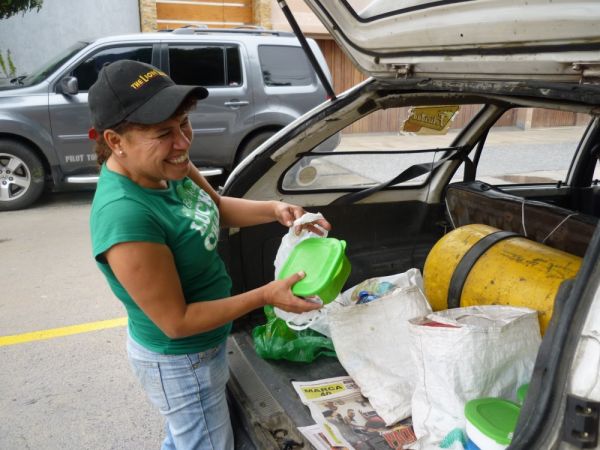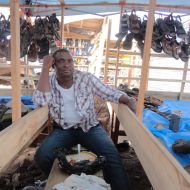A Covert Operation to Keep Lima’s Construction Workers Well-Fed

Maritsa prepares to haul her merchandise to one of the city’s many construction sites via an informal taxi. Photo credit: Manuel Vigo
“You have to suffer to sell food,” says Maritsa with a smile. A cheerful woman in her late forties, she is one of hundreds who provide home-cooked meals to construction workers across the city of Lima.
Maritsa’s morning starts at 7 a.m. when she starts putting together dozens of containers of food. On the day I visit her, the menu includes a salad, beans, beef and rice, all of which gets delivered directly to the construction sites she services. Customers pay five soles (about $2 USD) per meal. “They really like the food to have a lot of energy,” Maritsa says.
She took over the job from her mother, who started selling meals at construction sites some 15 years ago. “I lived with my grandmother and my mother, and we had heard about selling food at the construction sites. I was too embarrassed to do it. But my mother was happy to sell.”
Nevertheless, when her mother passed away, Maritsa took over her route, dragging a large metal cart around and trying to dodge the city inspectors. On average, she will bring enough food to feed 40 workers each day. She travels 30 minutes from her home in Villa El Salvador to San Isidro, one of Lima’s most upscale neighborhoods, because she can sell more in residential areas where workers don’t have access to affordable food.
Peru’s capital has seen massive growth in the past decade. A city that housed some 973,000 people in 1950 is now home to an estimated 8.4 million. The surge in population has spurred a construction boom the likes of which the country has never seen. The city is expanding at a rapid clip, and new buildings are going up everywhere.
Many of those buildings are going up on the sly. In a city where everything seems to be a sinewy blend of formal and informal, construction is no exception. In 2010, Peru’s Chamber of Construction estimated that 70 percent of the city’s families live in informally constructed buildings. For Maritsa, these informal construction sites are a gold mine. She says that a house that was there one day might be a pile of rubble the next, and the day after that a new building is rising in its place, presenting her with a potential new customer base.

One of Martisa’s pre-packaged meals. A frenetic construction boom has given her a steady supply of customers. Photo credit: Manuel Vigo
A loosely knit network of informants keeps her up to date on where to find customers. “Police often tell me about the new places,” she says. “They’ll point out where the construction work is, and then I go over.”
She says other vendors offer breakfast menus, and are at the site as early as 6 a.m. “I couldn’t do that though. They wake up at four in the morning just to prepare everything and get there.”
Long ago, when Maritsa’s mother was still on the job, Maritsa took over for 15 days when her mom had a health problem. It was the first time she’d ever made the deliveries, and it didn’t take long for municipal workers to see her awkwardly dragging her mother’s large cart around. They took all her food issued her a warning. “I cried like Mary Magdalene,” she laughs.
She’s since gotten savvier. These days Maritsa hires a taxi to get near areas where construction work is going on. She tells the driver – whose white station wagon is undoubtedly part of the city’s informal taxi fleet – to park some blocks away. She’ll leave most of her food in the backseat and unload it in small parcels to stay under the radar of municipal inspectors.
Even at the site, she works carefully. Contractors, she says, don’t care for her services. “Local neighbors sometimes complain that the workers are eating in the park or on the sidewalk; they don’t like that,” she says.
When we arrive at the site, the workers slowly make their way out of the walled-off construction pit. Maritsa knows what her repeat customers like, remembering them by face, and hands them their meals. No money is exchanged at the point of sale – her customers will pay for in one lump sum at the end of the week. They seem grateful for her food, barely looking up from the containers while they eat.
“Sometimes the workers have run out on me, and haven’t paid me for the week’s food.” But Maritsa is irrepressible. “You win some you lose some,” she says. “But the builders don’t always see it that way.”
She gives them time to eat alone and takes a short break. “Sometimes I get excited because I start getting new customers, and I feel I get things going, and then the construction finishes, and I have to start over.”
Out on the street things are not easy, she confides. When she’s not keeping an eye out for city officials, she fighting off competition.
“Sometimes other women come in and offer, and the workers will try her instead,” she says. “Often they will try you out for a week, a month, and get bored and then try out someone else’s food.”
She finishes handing out her meals early as the taxi that brought her here drives away. Tomorrow, they will both be back in the same spot. “I’ll usually go back to pick up the containers in an hour, then I get on a bus and head home,” she says.
On her way home Maritsa will stop at the market to pick up food for the next day. She tells me she can’t buy too far in advance, because her fridge can’t fit that much food.
“I start all over again for tomorrow,” she says. “I get the water boiling, and start chopping.”









